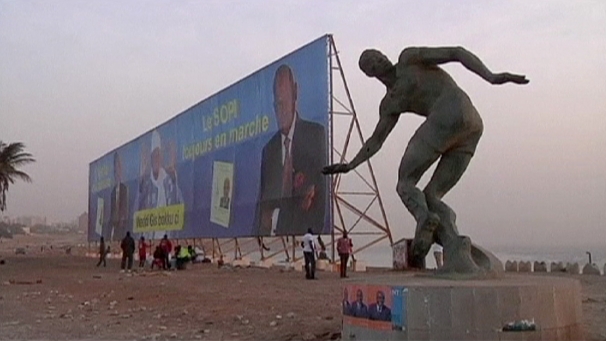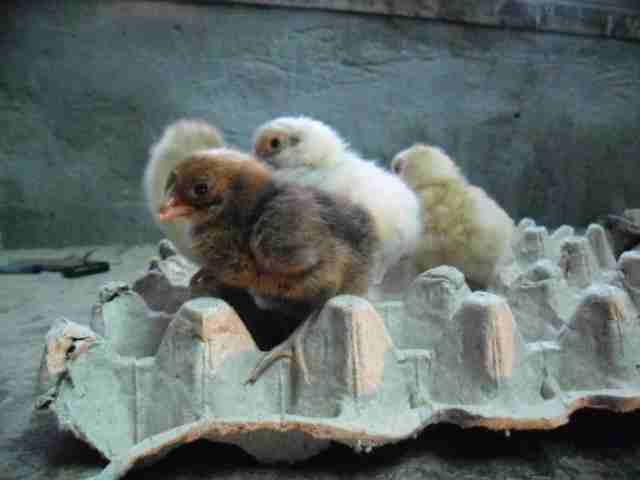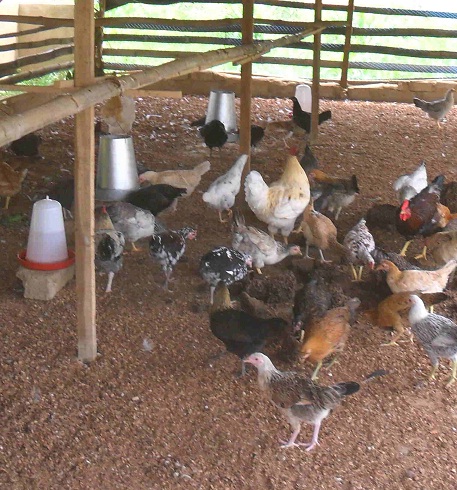Ending up with Prosperity?
I used to hold the view that if you take any nation-sized group of people and let them be governed by a reasonable political leadership that promotes rule of law, property rights, makes sensible investments with public funds (in areas such as education and infrastructure), upholds a liberal market based economic system, and fights corruption – then you are going to end up with prosperity after a while.
P’J O’Rourke has a good take how the choice of political/economic system trumps which people it’s applied on in “Give War a Chance“:
Personally I missed the old East Berlin. The only thing East Germany ever had going for it was a dramatic and sinister film noir atmosphere. When you passed through Checkpoint Charlie the movie footage seemed to switch to black and white. Steam rose from man-hole covers. Newspapers blew down wet, empty streets. You’d turn your trench coat collar up, hum a few bars of “Lili Marleen” and say to yourself, “This is me in East Berlin.”
That’s gone now and the place is revealed for what it’s really been all along, just a screwed-up poor country with a dictatorship. The dictatorship part is understandable, but how the Commies managed to make a poor country out of a nation full of Germans is a mystery. The huge demonstrations that had shaken East Germany for the past several months had one characteristic which distinguished them from all other huge demonstrations in history—they never began until after work. I went to one of these at Humboldt University. The students were demanding economics courses. It was hard to reconcile this with my own memories of student protest. We were demanding free dope for life.
However, a dozen years or so ago, I read “Make Democracy Work – Civic Traditions in Modern Italy” by Robert Putnam:
Putnam evaluates the institutional performance of twenty Italian regional governments using surveys, interviews and a diverse set of policy indicators. His central finding is that wide variations in the performance of these governments are closely related to the vibrancy of associational life in each region. In northern Italy, where citizens participate actively in sports clubs, literary guilds, service groups and choral societies, regional governments are “efficient in their internal operation, creative in their policy initiatives and effective in implementing those initiatives.”
In southern Italy, by contrast, where patterns of civic engagement are far weaker, regional governments tend to be corrupt and inefficient. Putnam explains this relationship between strong networks of citizen participation and positive institutional performance in terms of “social capital” — the networks, norms of reciprocity and trust that are fostered among the members of community associations by virtue of their experience of social interaction and cooperation.
It’s very hard to dismiss, it’s the same country, same law, same national government, same economic system, and yet two clearly different outcomes in northern and southern Italy. Putnam has tons of empirical data of associational life and other indicators linked to the somewhat fluffy concept of social capital, and they all show a striking difference between northern and southern Italy.
It managed to convince me at least, that while economic system and policies matter greatly for prosperity, there are other less tangible factors linked to people / culture / trust / social capital that are also important.
Trust
In “Trust” Francis Fukuyama discusses trust and social capital:
Trust is the expectation that arises within a community of regular, honest, and cooperative behaviour, based on commonly shared norms, on the part of other members of that community. Those norms can be about “deep value” questions like the nature of God or justice, but they also encompass secular norms like professional norms and codes of behaviour. That is, we trust the doctor not to do us deliberate injury because we expect him to live by the Hippocratic oath and the standards of the medical profession.
Social capital is a capability that arises from the prevalence of trust in a society or in certain parts of it. It can be embodied in the smallest and most basic social group, the family, as well as the largest of all groups, the nation, and all other groups in between.
[Social Capital] cannot be acquired, as in the case of other forms of human capital, through a rational investment decision. That is, an individual can decide to “invest” in conventional human capital like a college education, or training to become a machinist or computer programmer, simply by going to the appropriate school. Acquisition of human capital, by contrast, requires habituation to the moral norms of a community and, in this context, the acquisition of virtues like loyalty, honesty and dependability. The group, moreover, has to adopt common norms as a whole before trust can become generalized among its members.
The most useful kind of social capital is often not the ability to work under the authority of a community or group, but the capacity to form new association and to cooperate within the terms of reference they establish.
[…]
For example, in the Chinese parts of East Asia and in much of Latin America, social capital resides largely in families and a rather narrow circle of personal friends.
It is difficult for people to trust those outside of these narrow circles. Strangers fall into a different category than kin; a lower standard of moral behaviour applies when one becomes, for example, a public official. This provides cultural reinforcement for corruption: in such societies, one feels entitled to steal on behalf of one’s family. Corruption, of course, has many causes including, most importantly, the design of public institutions. But even well designed institutions will fail to function properly if the officials and political leaders at the top of judicial hierarchies themselves lack the proper norms of personal behaviour.
Still bullish on the Ivory Coast
I believe the Ivory Coast and most of Africa also are places where social capital largely resides in families, or rather extended families, and where levels of social capital are low overall. I ‘d say the Ivory Coast’s president Alassane Ouattara’s greatest challenge, is not the security situation, not how to deal with Gbagbo supporters, and not how to keep together the PDCI – RDR alliance, but how to deal with the hurdles created by low social capital.
It’s also a major challenge for anyone doing business in the Ivory Coast. I think it’s not uncommon that trust doesn’t extend much past an Ivorian’s extended family. Business is done with outsiders, but on a lower level of trust as – not without reason – deceit is expected from outsiders. It becomes more difficult (but not impossible) for corporations to grow in such circumstances, as it inevitably involves hiring and working with strangers.
Nevertheless, there are many examples of fast economic growth and flourishing businesses in a low social capital / low trust environment. It’s being well aware of the social capital issue that I’m bullish on the Ivory Coast.
Social capital is after all only one out several important factors for prosperity, and the causality isn’t clear between them. Is low social capital causing dysfunctional institutions and bad governance, or is there an arrow the other way too? What if the Ivory Coast manages to have – by African standards – very good institutions but still low social capital, would that negate negative effects of low social capital? And exactly how does the Ivory Coast stand in terms of social capital compared to the rest of Africa, and is it changing to the better? Guess there is no consensus on how to measure it, and I doubt anybody has tried to measure it in the Ivory Coast, so nobody knows.
Top Guy Syndrome explained
Fukuyama on the advantages of social capital:
The economic function of social capital is to reduce the transaction costs associated with formal co-ordination mechanisms like contracts, hierarchies, bureaucratic rules, and the like. It is of course possible to achieve co-ordinated action among a group of people possessing no social capital, but this would presumably entail additional transaction costs of monitoring, negotiating, litigating, and enforcing formal agreements.
No contract can possibly specify every contingency that may arise between the parties; most presuppose a certain amount of goodwill that prevents the parties from taking advantage of unforeseen loopholes. Contracts that do seek to try to specify all contingencies—like the job-control labour pacts negotiated in the car industry that were as thick as telephone books—end up being in exible and costly to enforce.
[…]
Even in non-hi-tech environments, social capital often leads to greater efficiency than do purely formal co-ordination techniques. Classical Taylorism, which organised workplaces in a highly centralised, bureaucratised manner, created many inefficiencies as decisions were delayed and information distorted while moving up and down hierarchical chains of command.
In many manufacturing facilities, Taylorism has been replaced by much flatter management structures which in effect push responsibility down to the factory floor itself. Workers who are much closer to the sources of local knowledge are authorized to make decisions on their own, rather than referring them up a managerial hierarchy. This often leads to great gains in efficiency, but is totally dependent on the social capital of the workforce. If there is distrust between workers and managers, or widespread opportunism, then the delegation of authority required in a typical ‘lean’ manufacturing system will lead to instant paralysis.
This is in effect what happened to General Motors during the strikes of 1996 and 1998, when a single dissident local (angry, in the first instance, over the outsourcing of brake parts) was able to shut down the company’s entire North American operations.
Ah, it looks like the Top Guy syndrome just got explained; to delegate one needs some social capital to avoid paralysis.
Fukuyama on the downsides of low social capital:
Low levels of social capital lead to a number of political dysfunctions, which have been extensively documented. Following Tocqueville’s analysis of France, many observers have noted how administrative centralisation has led to an excessively rigid and unresponsive political system, one that can be changed only through anti-systemic upsurges such as the evenements of 1968.
Low levels of social capital have been linked to inefficient local government in southern Italy, as well as to the region’s pervasive corruption. In many Latin American societies, a narrow radius of trust produces a two-tier moral system, with good behaviour reserved for family and personal friends, and a decidedly lower standard of behaviour in the public sphere. This serves as a cultural foundation for corruption, which is often regarded as a legitimate way of looking after one’s family.







